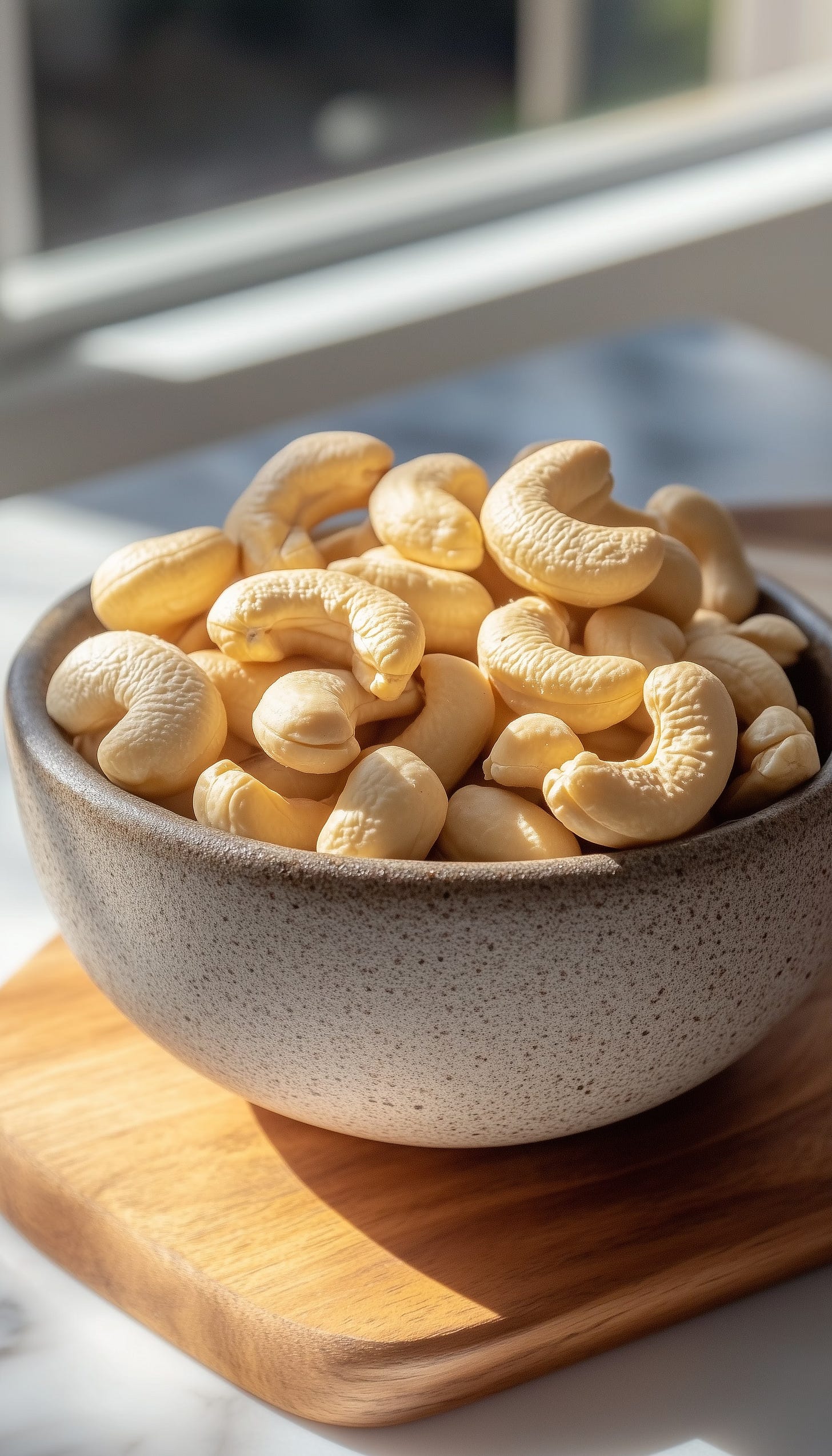Cashews are more than just a delicious snack—they’re a powerhouse of nutrients, with significant health benefits for your body, skin, and even your kitchen creations. Though commonly referred to as nuts, cashews are technically seeds, growing inside the shell of the cashew fruit, which is attached to the bottom of the cashew apple. This unique botanical fact makes cashews all the more interesting as a superfood. With their rich history and cultural symbolism, cashews have been enjoyed for centuries and continue to be celebrated in modern wellness practices.Let's explore the unique health benefits of cashews, their historical significance, and a sweet recipe to add to your repertoire.
Cultural and Historical Significance
Cashews originated in Brazil and were brought to India and Africa by Portuguese explorers in the 16th century. Today, India and Vietnam are the largest producers of cashews. The cashew tree, with its curious “false fruit” (the cashew apple), holds significance in various cultures. In traditional Indian medicine (Ayurveda), cashews were considered beneficial for heart health and were used in treatments to promote strength and vitality. In African cultures, the cashew tree is often a symbol of resilience, as it thrives in arid environments, producing a nourishing fruit despite harsh conditions.
5 Unique Health Benefits of Cashews
Rich in Heart-Healthy Fats
Cashews are packed with monounsaturated fats, particularly oleic acid, which is beneficial for heart health. These healthy fats help reduce bad cholesterol (LDL) levels and increase good cholesterol (HDL), lowering the risk of heart disease. Additionally, the magnesium in cashews supports vascular health, contributing to overall cardiovascular wellness.Protein and Nutrient-Dense
Cashews are an excellent source of plant-based protein, making them a great addition to vegetarian and vegan diets. They also contain essential vitamins and minerals such as magnesium, copper, zinc, and iron, all of which contribute to bone health, immunity, and energy production.Boosts Brain Health
The high levels of copper and magnesium found in cashews help regulate neurotransmitters, improving brain function and preventing cognitive decline. Cashews are also rich in antioxidants, which protect brain cells from oxidative damage and support long-term mental clarity.Promotes Skin Health
Cashews contain niacin, vitamin E, and other antioxidants that help promote skin health by fighting free radicals and improving skin hydration. The topical use of cashew oil is also said to help prevent dry skin, boost collagen production, and reduce signs of aging, though more research is needed to confirm these effects.Supports Weight Management
Despite being energy-dense, cashews can support weight management when consumed in moderation. Their combination of protein, fiber, and healthy fats helps promote satiety, reducing overall food intake. They also contain few sugars, making them a great snack option to prevent blood sugar spikes.
Cashew Milk: A Creamy, Dairy-Free Alternative
Cashew milk is an excellent dairy substitute for those seeking a plant-based alternative. It has a rich, creamy texture and is lower in calories than almond or soy milk, while still offering heart-healthy fats and essential minerals. Cashew milk is also naturally sweet, making it a great base for smoothies, coffee, or even desserts. Its versatility extends to savory dishes as well, where it can be used to create creamy sauces and soups.
Topical Benefits of Cashews
Though cashews are most commonly consumed, their oil can also provide topical benefits. Cashew oil is rich in fatty acids and antioxidants, which may help nourish dry skin and reduce inflammation. It is sometimes used in skincare products designed to moisturize and repair damaged skin, though as with any topical application, it's always best to do a patch test first to avoid allergic reactions.
My Favorite Cashew Dish: Cashew Stir-Fry
One of my favorite ways to enjoy cashews is in a vibrant stir-fry, where their creamy texture and mild flavor complement the fresh vegetables and savory sauces. The combination of cashews with ingredients like chicken, green beans, and a tangy soy-based sauce makes for a satisfying, nutrient-packed meal.
Sweet Cashew Recipe: Honey-Glazed Cashews
Ingredients:
2 cups raw cashews
¼ cup honey
2 tablespoons butter or coconut oil
1 teaspoon vanilla extract
A pinch of sea salt
Optional: cinnamon or nutmeg for added spice
Instructions:
Preheat your oven to 350°F (175°C) and line a baking sheet with parchment paper.
In a saucepan, melt the honey and butter (or coconut oil) over low heat, stirring until smooth. Add the vanilla extract and sea salt, stirring to combine.
Pour the honey mixture over the cashews, ensuring they are evenly coated.
Spread the cashews on the prepared baking sheet and bake for 10-12 minutes, stirring halfway through to ensure even toasting.
Remove from the oven and let them cool completely before serving. The cashews will harden as they cool, creating a deliciously sweet, crunchy snack.
Conclusion
Cashews are a unique, versatile nut with a rich cultural history and an impressive range of health benefits. Whether consumed whole, as milk, or applied topically, cashews offer numerous ways to nourish your body. From supporting heart health and brain function to providing plant-based nutrition, cashews are a small but mighty addition to any diet. And for a delightful treat, don't forget to try the honey-glazed cashew recipe!







